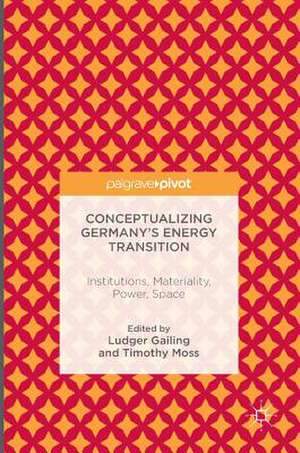Conceptualizing Germany’s Energy Transition: Institutions, Materiality, Power, Space
Editat de Ludger Gailing, Timothy Mossen Limba Engleză Hardback – 3 iun 2016
Preț: 418.45 lei
Nou
Puncte Express: 628
Preț estimativ în valută:
80.07€ • 83.82$ • 66.25£
80.07€ • 83.82$ • 66.25£
Carte tipărită la comandă
Livrare economică 05-19 aprilie
Preluare comenzi: 021 569.72.76
Specificații
ISBN-13: 9781137505927
ISBN-10: 1137505923
Pagini: 144
Ilustrații: XV, 147 p. 3 illus.
Dimensiuni: 148 x 210 x 13 mm
Greutate: 0.35 kg
Ediția:1st ed. 2016
Editura: Palgrave Macmillan UK
Colecția Palgrave Pivot
Locul publicării:London, United Kingdom
ISBN-10: 1137505923
Pagini: 144
Ilustrații: XV, 147 p. 3 illus.
Dimensiuni: 148 x 210 x 13 mm
Greutate: 0.35 kg
Ediția:1st ed. 2016
Editura: Palgrave Macmillan UK
Colecția Palgrave Pivot
Locul publicării:London, United Kingdom
Cuprins
Chapter 1: Introduction; Timothy Moss and Ludger Gailing.- Chapter 2: Germany's Energiewende and the spatial configuration of an energy system; Ludger Gailing and Andreas Röhring.- Chapter 3: Energy transitions and institutional change: between structure and agency; Sören Becker, Ross Beveridge and Andreas Röhring.- Chapter 4: Energy transitions and materiality: between dispositives, assemblages and metabolisms; Timothy Moss, Sören Becker and Ludger Gailing.- Chapter 5: Energy transitions and power: between governmentality and depoliticization; Andrea Bues and Ludger Gailing.- Chapter 6: The importance of space: towards a socio-material and political geography of energy transitions; Sören Becker, Timothy Moss and Matthias Naumann.- Chapter 7: Conclusions and outlook for future energy transitions research; Ludger Gailing and Timothy Moss.-
Recenzii
Notă biografică
Ludger Gailing is deputy head of the research department of Institutional Change and Regional Public Goods at the Leibniz Institute for Research on Society and Space (IRS), Germany. In his work he draws on concepts relating to governance and institutional theories, constructivist perspectives on space and place, governmentality and socio-materiality. Current research foci include energy transitions and landscape policies.
Timothy Moss is head of the research department of Institutional Change and Regional Public Goods at the Leibniz Institute for Research on Society and Space (IRS), Germany. His research interests span the governance of urban infrastructures past and present, the spatial organization of water and energy and the institutional dynamics of resource use in cities and regions.
Timothy Moss is head of the research department of Institutional Change and Regional Public Goods at the Leibniz Institute for Research on Society and Space (IRS), Germany. His research interests span the governance of urban infrastructures past and present, the spatial organization of water and energy and the institutional dynamics of resource use in cities and regions.
Textul de pe ultima copertă
This is the first book to explore ways of conceptualizing Germany’s ongoing energy transition. Although widely acclaimed in policy and research circles worldwide, the Energiewende is poorly understood in terms of social science scholarship. There is an urgent need to delve beyond descriptive accounts of policy implementation and contestation in order to unpack the deeper issues at play in what has been termed a 'grand societal transformation.' The authors approach this in three ways: First, they select and characterize conceptual approaches suited to interpreting the reordering of institutional arrangements, socio-material configurations, power relations and spatial structures of energy systems in Germany and beyond. Second, they assess the value of these concepts in describing and explaining energy transitions, pinpointing their relative strengths and weaknesses and exploring areas of complementarity and incompatibility. Third, they illustrate how theseconcepts can be applied – individually and in combination – to enrich empirical research of Germany’s energy transition.
Caracteristici
ons.” (Harald Rohracher, Professor of Technology and Social Change, Linköping University, Sweden) Brings together concepts in energy transitions research in one volume Situates these in the context of Germany's Energiewnede Engages with social scientific theories of space, power and materiality This important book breaks new ground in theorising low carbon transitions, casting fresh conceptual light on the nature of energy transitions and their spatial, material and political dimensions.” (Harriet Bulkeley, Department of Geography, Durham University, UK) A theoretically grounded, concise and topical account of the spatial and infrastructural dynamics that accompany Germany’s momentous efforts to transform its energy sector towards a more climate-friendly future.” (Stefan Bouzarovski, Director of the Centre for Urban Resilience and Energy, University of Manchester, UK) This book is a great contribution, developing conceptual tools to better understand and analyze the socio-material entanglements shaping energy transiti
